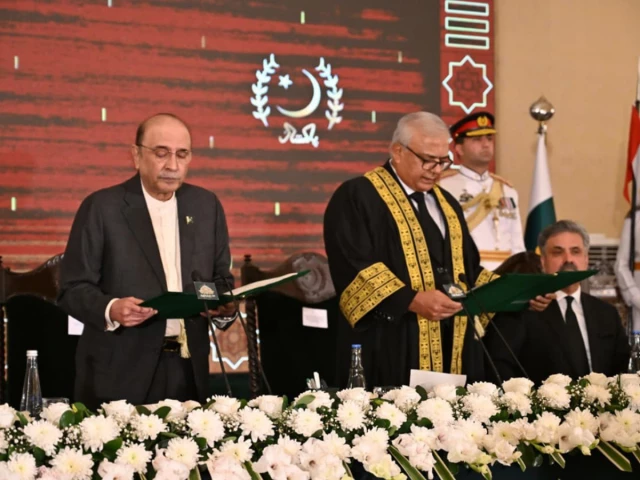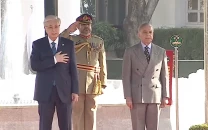Who is who on the first bench of newly formed Federal Constitutional Court?
CJ Aminuddin led SC CB formed under 26th Amendment; ruled in favour of military trials, govt in reserved seats case

Justice Aminuddin Khan took oath on Friday as the first chief justice of the newly established Federal Constitutional Court at a ceremony held at Aiwan-i-Sadr.
President Asif Ali Zardari administered the oath to the newly appointed chief justice in the packed hall.
Prime Minister Shehbaz Sharif, Chief Justice of Pakistan Yahya Afridi, Senate Chairman Syed Yousaf Raza Gilani, National Assembly Speaker Sardar Ayaz Sadiq, First Lady Aseefa Bhutto Zardari, federal ministers, Chief of Army Staff Field Marshal Asim Munir, Chairman Joint Chiefs of Staff Committee Gen Sahir Shamshad Mirza and PPP Chairman Bilawal Bhutto-Zardari were among those present. A number of parliamentarians and members of the legal community also attended the ceremony.
Justice Aminuddin’s appointment follows the passage of the 27th Constitutional Amendment, now part of the Constitution after President Asif Ali Zardari’s signature.
Read: President signs 27th Amendment Bill into law
The amendment reshapes the judicial structure: the sitting Chief Justice, Yahya Afridi retains the title as ‘Chief Justice of Pakistan' until completing their term, while the senior-most between the Chief Justice of the Supreme Court and the Chief Justice of the Federal Constitutional Court will be recognised as Chief Justice of Pakistan later after Justice Yahya Afridi retires.
It further authorises the president to appoint FCC judges on the prime minister’s advice — a move that has triggered intense debate within legal circles.
Appointment of six judges for FCC
President Asif Ali Zardari has appointed six judges to the Federal Constitutional Court (FCC), following the swearing-in of Justice Aminuddin Khan as its first Chief Justice earlier today.
The six appointees are Justice Syed Hasan Azhar Rizvi, Justice Aamer Farooq, Justice Ali Baqar Najafi, Justice Muhammad Karim Khan Agha, Justice Rozi Khan Barrech, and Justice Arshad Hussain Shah.
Three of the judges — Justice Rizvi, Justice Farooq, and Justice Najafi — have taken the oath, administered by Chief Justice Aminuddin at the Islamabad High Court.
Several judges were absent from the ceremony, including Justices Mohsin Akhtar Kayani and Tariq Mahmood Jahangiri of the IHC, as well as Justices Ijaz Ishaq Khan, Babar Sattar, and Saman Rafat Imtiaz. Present at the ceremony were Justices Arbab Muhammad Tahir, Muhammad Asif, Muhammad Azam Khan, and Raja Inam Amin Minhas.
The Federal Constitutional Court represents a long-standing democratic commitment first envisioned in the 2006 Charter of Democracy, signed by the Pakistan People’s Party (PPP) and the Pakistan Muslim League-Nawaz (PML-N).
Justice Aminuddin Khan’s nomination aligns perfectly with the CoD’s original intent. It is to create a specialised constitutional body to strengthen judicial independence and allow the Supreme Court to focus on appellate work.
As Chief Justice of the FCC, Justice Aminuddin will oversee a court of seven judges — four from the Supreme Court and two from the high courts — with a retirement age of 68, three years beyond that of the Supreme Court.
The court has exclusive jurisdiction over constitutional interpretation, intergovernmental disputes, and presidential or parliamentary references, marking a structural transformation in Pakistan’s judicial landscape, one that Justice Aminuddin is uniquely positioned to lead.
Justice Aminuddin Khan’s judicial journey
Justice Aminuddin Khan’s elevation follows a long judicial career spanning four decades. Born in Multan in 1960 to a family of lawyers, he began legal practice in 1984 under his father, Khan Sadiq Muhammad Ahsan.
He was enrolled as an advocate of the Lahore High Court in 1987 and became an advocate of the Supreme Court in 2001. He was appointed to the Lahore High Court in 2011 and elevated to the Supreme Court in 2019, where he currently heads the Constitutional Bench.
Read: Supreme Court judges Mansoor Ali Shah, Athar Minallah resign after passage of 27th Amendment
Alongside the Chief Justice and Justice Mansoor Ali Shah, he joined a three-judge committee under the Supreme Court (Practice and Procedure) Act, 2023, tasked with deciding which constitutional cases would be referred to the new bench. His inclusion underscored his growing institutional authority and trust among fellow judges.
In November 2024, following the passage of the 26th Constitutional Amendment, the Judicial Commission of Pakistan (JCP) voted to appoint him as Head of the newly constituted seven-judge Constitutional Bench of the Supreme Court. The decision, passed by a narrow seven-to-five majority, placed Justice Aminuddin at the helm of a bench with exclusive jurisdiction over constitutional interpretation, marking a major shift in Pakistan’s judicial power dynamics.
The judge whose decision in reserved seats case helped govt to get 2/3 majority in National Assembly, allowed civilians trial in military courts & supported almost every executive decision related to judges appointment during JCP meetings is being nominated as Chief Justice of… https://t.co/TJWbjfaTig
— Hasnaat Malik (@HasnaatMalik) November 13, 2025
Among his notable contributions is his dissenting note alongside Justice Naeem Akhtar Afghan against the Supreme Court ruling that declared the Pakistan Tehreek-e-Insaf (PTI) eligible for the reserved seats, overturning earlier Election Commission and Peshawar High Court decisions. He noted that PTI was not a party to the case and that granting relief would exceed the court’s constitutional jurisdiction.
However, while heading a Constitutional Bench, Justice Aminuddin reviewed the case and on June 29, 2025, set aside the July 12, 2024 decision, declaring PTI ineligible for reserved seats and restoring the Peshawar High Court’s original ruling, which had dismissed PTI’s claim as SIC had not participated in the elections.
He was also a member of the nine-judge bench that examined the presidential reference concerning the hanging of former Prime Minister Zulfikar Ali Bhutto.
He also headed a Constitutional Bench that, with a 5-2 majority on September 23, 2025, held civilian trials under the Army Act ‘constitutional’ if conducted within statutory limits and procedural safeguards.
Also Read: Senate passes military reforms approved under 27th Constitutional Amendment
Throughout his career, Justice Aminuddin has authored several rulings in civil and constitutional law. As head of the Constitutional Bench, he has overseen cases related to constitutional interpretation and judicial review, contributing to the legal framework that underpins the FCC.
The FCC, created under the 27th Constitutional Amendment, has exclusive authority over constitutional interpretation, federal–provincial disputes, and questions referred by the President or Parliament. Justice Aminuddin has been appointed as its first Chief Justice shortly before his Supreme Court retirement, leading the court from its inception.
Yet his nomination has sparked unease in legal circles. Critics note that Justice Aminuddin authored the ‘reserved seats ruling’ that enabled the government’s two-thirds majority, endorsed the ‘trial of civilians in military courts’, and consistently sided with the executive on judicial appointments in JCP meetings. To them, elevating the same judge to lead the country’s new apex constitutional court signals a consolidation of power at a moment when judicial independence is already under strain.





















COMMENTS
Comments are moderated and generally will be posted if they are on-topic and not abusive.
For more information, please see our Comments FAQ